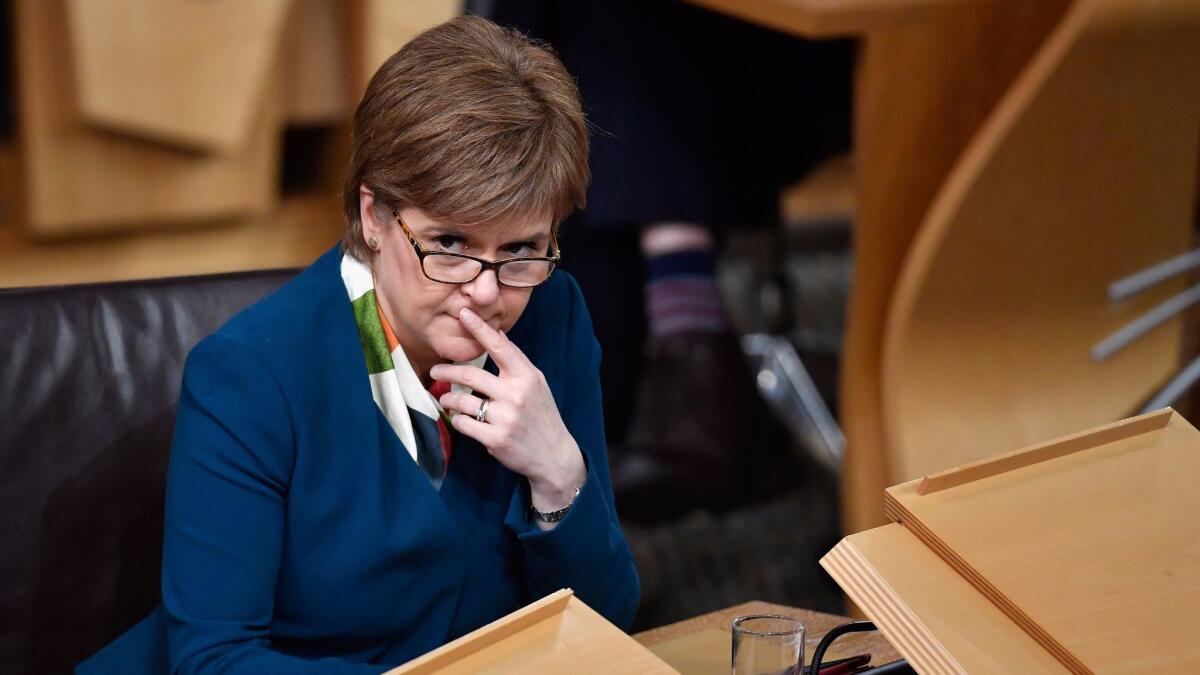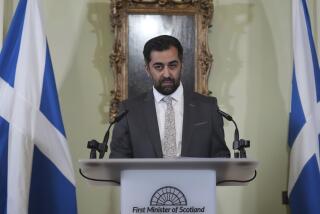Scotland’s leader to seek new independence referendum

- Share via
Reporting from LONDON — The leader of Scotland announced plans Monday to seek a second independence referendum, throwing the future unity of Britain into fresh doubt as the country stands on the cusp of its lengthy withdrawal process from the European Union.
Citing the need to protect her constituents’ interests, Scottish First Minister Nicola Sturgeon launched into a blistering attack on British Prime Minister Theresa May for failing to make any attempt to find common ground but instead doggedly pursuing a so-called hard Brexit.
“The U.K. government has not moved even an inch in pursuit of compromise and agreement,” she said, adding that she had only been met with a “brick wall of intransigence.”
Britain voted to leave the EU by 52% to 48% in June’s referendum, a vote that is colloquially known as Brexit.
Scottish voters, however, voted overwhelmingly to remain part of the 28-member bloc by 62% to 38%.
Sturgeon said she had previously been encouraged by May to try to find a way forward that would keep Britain united as it navigates the difficult course ahead.
But she felt she had been left with no alternative after the prime minister said in a January speech that there could be no “half in, half out” deal.
It was the clearest indication to date of what a post-Brexit Britain might look like, with May saying Britain would withdraw from the European single market — which guarantees the free movement of goods, capital, services and people — in order to regain control of immigration policy and laws.
The prime minister also cast doubt on Britain’s future membership in the EU’s customs union, which guarantees tariff-free trade within Europe but limits the ability of its members to negotiate individual trade deals with non-European countries.
Sturgeon’s attempt to find middle ground had included the suggestion that Scotland get its own Brexit deal, separate from the rest of Britain, but those pleas fell on deaf ears.
“The language of partnership has gone completely,” Sturgeon said. “If Scotland can be ignored on an issue as important as our membership of the European Union and the single market, then it is clear that our voice and our interests can be ignored at any time on any issue.”
May responded fiercely to Monday’s speech, saying it was “deeply regrettable” and accusing Sturgeon of “tunnel vision” and turning politics into a game. “It sets Scotland on a course for more uncertainty and division,” she said.
Sturgeon said the timing of Scotland’s second referendum was crucial.
She wants the vote to be held between the fall of 2018 and the spring of 2019, which should be roughly when the United Kingdom’s Brexit negotiations will conclude.
“If Scotland is to have a real choice, when the terms of Brexit are known ... that choice must be offered,” she said.
Sturgeon announced that she would put the matter to the Scottish Parliament next week, but ultimately it is May’s government in London that has to approve the legally binding referendum.
The previous 2014 independence referendum was allowed to take place only after lengthy negotiations between the two sides, and ultimately ended with Scotland voting against becoming an independent country by a margin of 55% to 45%.
Polls show there is currently little appetite in Scotland for another referendum, but the Scottish National Party was voted in at the last election with a manifesto that included a pledge to hold a second referendum if there was “significant and material change” in circumstances, including if Scotland was unwillingly taken out of the EU.
“These conditions have of course now been met,” Sturgeon said.
Labor leader Jeremy Corbyn said that his party believed it would be wrong to hold another referendum so soon after the previous one, which had been billed as a “once in a generation event.”
“If, however, the Scottish Parliament votes for one, Labor will not block that democratic decision at Westminster,” he added.
On Monday night, Parliament was also meeting to debate the terms of the EU Withdrawal Bill. If passed as widely expected, the legislation will pave the way for the prime minister to trigger Article 50 of the Lisbon Treaty, which officially starts the formal two-year EU exit process.
May has said she wants to put that process in motion before the end of March.
Boyle is a special correspondent.
ALSO
U.K. lawmakers back bill to trigger Brexit talks
After the Brexit vote, Britain’s independence party struggles with ‘existential crisis’
UPDATES:
3:20 p.m.: Updates throughout with staff reporting.
6:45 a.m.: This article was updated with reactions from the United Kingdom government, as well as details about Scotland’s proposed efforts to leave the U.K.
This article was originally published at 5:05 a.m.
More to Read
Sign up for Essential California
The most important California stories and recommendations in your inbox every morning.
You may occasionally receive promotional content from the Los Angeles Times.










